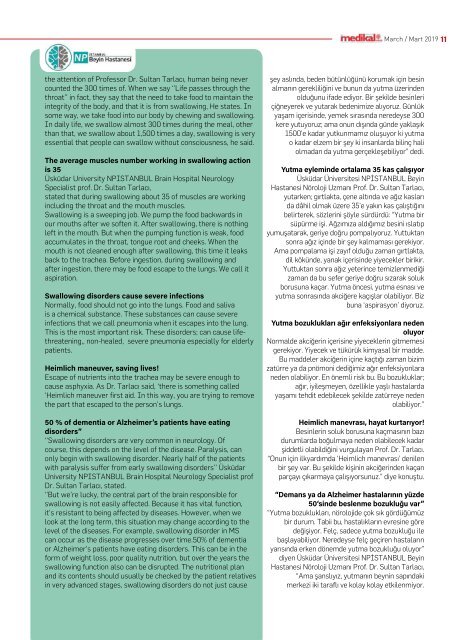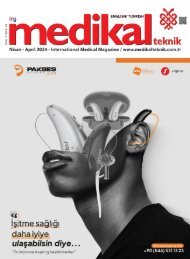Medikal Teknik Mart 2019
Medikal Teknik Mart 2019
Medikal Teknik Mart 2019
Create successful ePaper yourself
Turn your PDF publications into a flip-book with our unique Google optimized e-Paper software.
March / <strong>Mart</strong> <strong>2019</strong> 11<br />
the attention of Professor Dr. Sultan Tarlacı, human being never<br />
counted the 300 times of. When we say ‘’Life passes through the<br />
throat’’ in fact, they say that the need to take food to maintain the<br />
integrity of the body, and that it is from swallowing, He states. In<br />
some way, we take food into our body by chewing and swallowing.<br />
In daily life, we swallow almost 300 times during the meal, other<br />
than that, we swallow about 1,500 times a day, swallowing is very<br />
essential that people can swallow without consciousness, he said.<br />
The average muscles number working in swallowing action<br />
is 35<br />
Üsküdar University NPISTANBUL Brain Hospital Neurology<br />
Specialist prof. Dr. Sultan Tarlacı,<br />
stated that during swallowing about 35 of muscles are working<br />
including the throat and the mouth muscles.<br />
Swallowing is a sweeping job. We pump the food backwards in<br />
our mouths after we soften it. After swallowing, there is nothing<br />
left in the mouth. But when the pumping function is weak, food<br />
accumulates in the throat, tongue root and cheeks. When the<br />
mouth is not cleaned enough after swallowing, this time it leaks<br />
back to the trachea. Before ingestion, during swallowing and<br />
after ingestion, there may be food escape to the lungs. We call it<br />
aspiration.<br />
Swallowing disorders cause severe infections<br />
Normally, food should not go into the lungs. Food and saliva<br />
is a chemical substance. These substances can cause severe<br />
infections that we call pneumonia when it escapes into the lung.<br />
This is the most important risk. These disorders; can cause lifethreatening,,<br />
non-healed, severe pneumonia especially for elderly<br />
patients.<br />
Heimlich maneuver, saving lives!<br />
Escape of nutrients into the trachea may be severe enough to<br />
cause asphyxia. As Dr. Tarlacı said, ‘there is something called<br />
‘Heimlich maneuver first aid. In this way, you are trying to remove<br />
the part that escaped to the person’s lungs.<br />
50 % of dementia or Alzheimer’s patients have eating<br />
disorders”<br />
‘’Swallowing disorders are very common in neurology. Of<br />
course, this depends on the level of the disease. Paralysis, can<br />
only begin with swallowing disorder. Nearly half of the patients<br />
with paralysis suffer from early swallowing disorders’’ Üsküdar<br />
University NPISTANBUL Brain Hospital Neurology Specialist prof<br />
Dr. Sultan Tarlacı, stated.<br />
‘’But we’re lucky, the central part of the brain responsible for<br />
swallowing is not easily affected. Because it has vital function,<br />
it’s resistant to being affected by diseases. However, when we<br />
look at the long term, this situation may change according to the<br />
level of the diseases. For example, swallowing disorder in MS<br />
can occur as the disease progresses over time.50% of dementia<br />
or Alzheimer’s patients have eating disorders. This can be in the<br />
form of weight loss, poor quality nutrition, but over the years the<br />
swallowing function also can be disrupted. The nutritional plan<br />
and its contents should usually be checked by the patient relatives<br />
in very advanced stages, swallowing disorders do not just cause<br />
şey aslında, beden bütünlüğünü korumak için besin<br />
almanın gerekliliğini ve bunun da yutma üzerinden<br />
olduğunu ifade ediyor. Bir şekilde besinleri<br />
çiğneyerek ve yutarak bedenimize alıyoruz. Günlük<br />
yaşam içerisinde, yemek sırasında neredeyse 300<br />
kere yutuyoruz; ama onun dışında günde yaklaşık<br />
1500’e kadar yutkunmamız oluşuyor ki yutma<br />
o kadar elzem bir şey ki insanlarda bilinç hali<br />
olmadan da yutma gerçekleşebiliyor” dedi.<br />
Yutma eyleminde ortalama 35 kas çalışıyor<br />
Üsküdar Üniversitesi NPİSTANBUL Beyin<br />
Hastanesi Nöroloji Uzmanı Prof. Dr. Sultan Tarlacı,<br />
yutarken; gırtlakta, çene altında ve ağız kasları<br />
da dâhil olmak üzere 35’e yakın kas çalıştığını<br />
belirterek, sözlerini şöyle sürdürdü: “Yutma bir<br />
süpürme işi. Ağzımıza aldığımız besini ıslatıp<br />
yumuşatarak, geriye doğru pompalıyoruz. Yuttuktan<br />
sonra ağız içinde bir şey kalmaması gerekiyor.<br />
Ama pompalama işi zayıf olduğu zaman gırtlakta,<br />
dil kökünde, yanak içerisinde yiyecekler birikir.<br />
Yuttuktan sonra ağız yeterince temizlenmediği<br />
zaman da bu sefer geriye doğru sızarak soluk<br />
borusuna kaçar. Yutma öncesi, yutma esnası ve<br />
yutma sonrasında akciğere kaçışlar olabiliyor. Biz<br />
buna ‘aspirasyon’ diyoruz.<br />
Yutma bozuklukları ağır enfeksiyonlara neden<br />
oluyor<br />
Normalde akciğerin içerisine yiyeceklerin gitmemesi<br />
gerekiyor. Yiyecek ve tükürük kimyasal bir madde.<br />
Bu maddeler akciğerin içine kaçtığı zaman bizim<br />
zatürre ya da pnömoni dediğimiz ağır enfeksiyonlara<br />
neden olabiliyor. En önemli risk bu. Bu bozukluklar;<br />
ağır, iyileşmeyen, özellikle yaşlı hastalarda<br />
yaşamı tehdit edebilecek şekilde zatürreye neden<br />
olabiliyor.”<br />
Heimlich manevrası, hayat kurtarıyor!<br />
Besinlerin soluk borusuna kaçmasının bazı<br />
durumlarda boğulmaya neden olabilecek kadar<br />
şiddetli olabildiğini vurgulayan Prof. Dr. Tarlacı.<br />
“Onun için ilkyardımda ‘Heimlich manevrası’ denilen<br />
bir şey var. Bu şekilde kişinin akciğerinden kaçan<br />
parçayı çıkarmaya çalışıyorsunuz.” diye konuştu.<br />
“Demans ya da Alzheimer hastalarının yüzde<br />
50‘sinde beslenme bozukluğu var”<br />
“Yutma bozuklukları, nörolojide çok sık gördüğümüz<br />
bir durum. Tabii bu, hastalıkların evresine göre<br />
değişiyor. Felç, sadece yutma bozukluğu ile<br />
başlayabiliyor. Neredeyse felç geçiren hastaların<br />
yarısında erken dönemde yutma bozukluğu oluyor”<br />
diyen Üsküdar Üniversitesi NPİSTANBUL Beyin<br />
Hastanesi Nöroloji Uzmanı Prof. Dr. Sultan Tarlacı,<br />
“Ama şanslıyız, yutmanın beynin sapındaki<br />
merkezi iki taraflı ve kolay kolay etkilenmiyor.

















